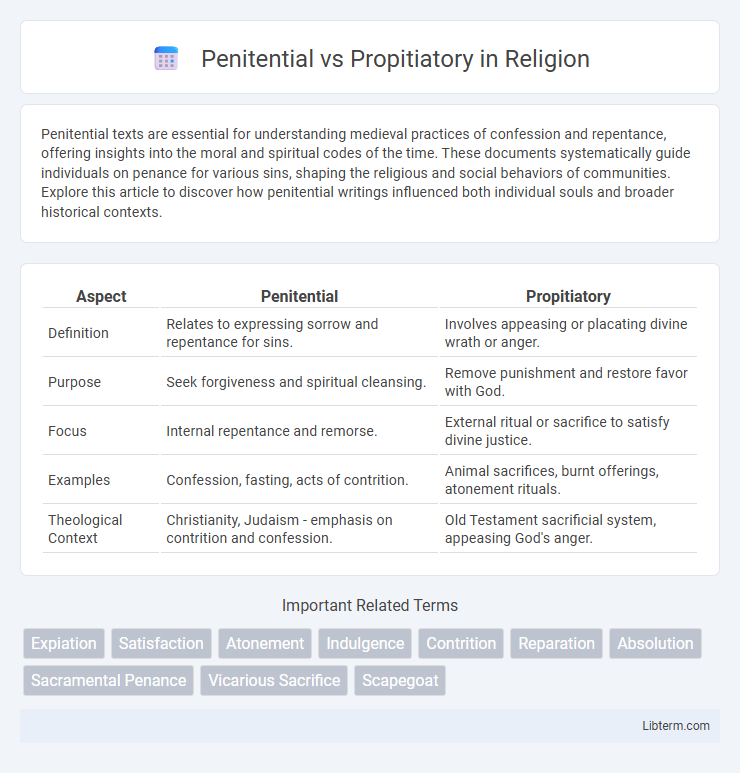Penitential texts are essential for understanding medieval practices of confession and repentance, offering insights into the moral and spiritual codes of the time. These documents systematically guide individuals on penance for various sins, shaping the religious and social behaviors of communities. Explore this article to discover how penitential writings influenced both individual souls and broader historical contexts.
Table of Comparison
| Aspect | Penitential | Propitiatory |
|---|---|---|
| Definition | Relates to expressing sorrow and repentance for sins. | Involves appeasing or placating divine wrath or anger. |
| Purpose | Seek forgiveness and spiritual cleansing. | Remove punishment and restore favor with God. |
| Focus | Internal repentance and remorse. | External ritual or sacrifice to satisfy divine justice. |
| Examples | Confession, fasting, acts of contrition. | Animal sacrifices, burnt offerings, atonement rituals. |
| Theological Context | Christianity, Judaism - emphasis on contrition and confession. | Old Testament sacrificial system, appeasing God's anger. |
Understanding Penitential and Propitiatory: Key Definitions
Penitential refers to expressions of remorse and repentance for sins, emphasizing a heartfelt acknowledgment of wrongdoing and a commitment to change. Propitiatory involves actions or offerings intended to appease or reconcile with a deity, aiming to restore favor and avert divine wrath. Understanding these key theological terms highlights their distinct roles in religious practices related to atonement and forgiveness.
Historical Origins of Penitential and Propitiatory Concepts
The historical origins of penitential concepts trace back to ancient religious practices in Judaism and early Christianity, where repentance and confession were essential for spiritual purification. Propitiatory rituals originated in ancient pagan religions, emphasizing appeasement of deities through sacrifices to avert divine wrath and gain favor. Over time, Christian theology integrated these ideas, distinguishing penitential acts as expressions of remorse, and propitiatory offerings as means to satisfy divine justice.
Penitential Practices Across Cultures and Religions
Penitential practices across cultures often involve acts such as fasting, prayer, and self-denial to atone for sins and seek forgiveness, exemplified in Christianity's confession and Islamic Ramadan fasting. These rituals emphasize personal repentance and moral transformation, fostering spiritual growth and reconciliation with the divine. In Hinduism, penitential acts like pilgrimages and sacred fire rituals serve to purify the soul and restore dharma through sincere remorse and dedication.
Propitiatory Rituals: Appeasing the Divine
Propitiatory rituals are designed to appease the divine by offering sacrifices, prayers, or gifts that seek to restore favor and prevent wrath. These rituals emphasize reconciliation with deities through acts demonstrating devotion, often aiming to avert misfortune or secure blessings. Central to many religious traditions, propitiation serves as a means to maintain cosmic harmony by addressing divine displeasure.
Theological Distinctions: Penitence vs. Propitiation
Penitential acts emphasize confession and repentance, acknowledging human sinfulness and expressing sorrow to seek forgiveness from God. Propitiatory sacrifices focus on appeasing God's wrath through atonement, aiming to restore divine favor and reconcile the broken relationship between humanity and the divine. These theological distinctions highlight penitence as a human response to sin, while propitiation centers on Christ's redemptive work that satisfies divine justice.
Psychological Dimensions of Guilt and Atonement
Penitential approaches emphasize internal psychological processes of guilt, focusing on self-reflection, remorse, and personal transformation as pathways to atonement. Propitiatory frameworks address guilt through external appeasement, aiming to restore balance by satisfying perceived demands of justice or divine will. Understanding the psychological dimensions reveals how penitential methods foster intrinsic healing, whereas propitiatory practices often rely on symbolic acts to mitigate feelings of moral guilt.
Penitential Acts in Modern Spirituality
Penitential acts in modern spirituality emphasize personal accountability and the sincere expression of remorse to foster inner transformation and spiritual growth. These practices often involve confession, meditation, and acts of self-discipline aimed at healing the relationship between the individual and the divine. Unlike propitiatory rites that seek to appease divine wrath, penitential acts focus on repentance and moral realignment within contemporary spiritual frameworks.
Propitiatory Offerings: Symbols and Significance
Propitiatory offerings symbolize the appeasement of divine wrath through sacrifices that seek to restore favor and harmony between humans and deities. These offerings often involve rituals that emphasize cleansing, atonement, and reconciliation, highlighting the significance of appeasing God's justice and mercy. The central symbol of propitiatory offerings is the sacrificial animal, representing the transfer of guilt and the restoration of spiritual balance in religious traditions.
Philosophical Perspectives on Forgiveness and Reconciliation
Penitential frameworks emphasize self-reflection and acceptance of responsibility as essential steps toward forgiveness and reconciliation, highlighting the moral transformation of the offender. Propitiatory approaches focus on appeasing the offended party's sense of justice by offering reparations or symbolic gestures to restore social harmony. Philosophically, penitential perspectives prioritize internal ethical renewal, while propitiatory models stress external restoration of trust and relational balance.
Contemporary Relevance: Penitential vs. Propitiatory in Today’s World
Penitential and propitiatory concepts continue to shape religious practices and ethical frameworks in contemporary society, influencing how individuals and communities approach forgiveness and reconciliation. Penitential acts emphasize sincere remorse and personal transformation as pathways to restore moral balance, whereas propitiatory rites focus on appeasing divine wrath to regain favor and prevent further harm. Understanding these distinctions informs interfaith dialogues, therapeutic healing methods, and restorative justice models that address both internal repentance and external reconciliation processes.
Penitential Infographic

 libterm.com
libterm.com